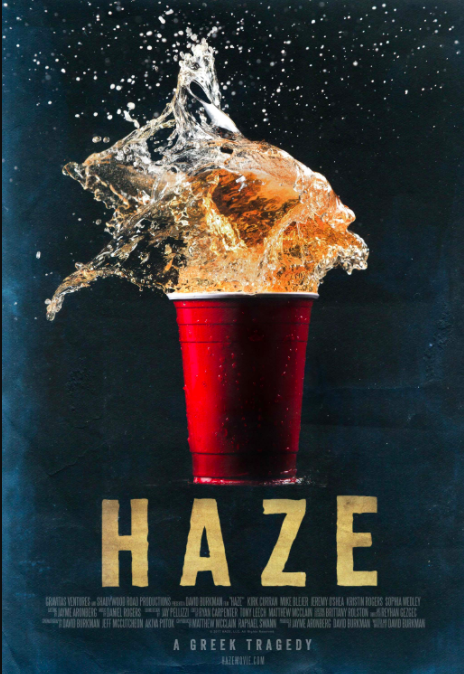“HAZE,” directed by David Burkman, is an insightful movie that helps visualize what life is like as a pledge in a fraternity. Released on Oct. 17 of last year, the film tells the story of four deaths caused by fraternity hazing.
It won Best Film at the Sidewalk Film Festival and Best Feature at the Washington D.C. Independent Film Festival. Though fictional, the film’s dark and gut-wrenching scenes are what makes it feel so real. “HAZE” conveys the tension between ideal self versus the actual self, while fulfilling the human need for intensity. It forces audiences to become active participants in a movie solely based off of college experiences and decision making.
Nick, played by Kirk Curran, is just a normal college freshman looking for women, partying and a group of guys he can call his brothers. His older brother and polar opposite, Pete, played by Mike Blejer, could not be more against it. Pete is committed to exposing the truth behind the rule-breaking and inhumane acts that occur behind the scenes in Greek life after a student dies from fraternity hazing.
After Nick gets a bid from Psi Theta Epsilon, we follow him through his experience pledging at the most notorious frat on campus. We watch as some of his relationships crumble, while others grow. We watch as he and his other pledging peers struggle with maintaining a social life and a solid GPA.

We watch these boys drink until they pass out while indulging in the wild hookup culture that exists today. We are exposed to both the side that everyone sees in public and the underground look into what pledging a frat is actually like.
Psi Theta Epsilons’ basement is where the madness happens. The scenes show verbal abuse inflicted by their pledge master as each boy is tested on random facts about the chapter. Some scenes escalate to the point where the boys are saran wrapped to a pole, incapable of moving while being fed vodka through a funnel. The pledging process shows boys practically killing themselves through vulgar acts to become a part of a community that continues a ritual for years to come.
While each scene varies in intensity, Burkman does an outstanding job in using effects that help us, as viewers, step into their shoes. During the day, when the boys are living their normal lives and interacting with one another, visuals are clear and calm. At night, not so much.
As each day progresses and the weeks pass, we finally reach the time where the boys must prove their worth: Hell Week. During Hell Week, the film drastically changes into a horror movie. Each image is choppy and dark with a musical soundtrack possibly made by Satan himself.
Muscadine Bloodline brings Alabama flair, rocking country vocals to Madison
Out of the many goals of this film, one was to challenge viewers to put themselves in the positions of the characters within the movie. The movie was made to ask viewers, what would you do? There are points in this movie where you might have to pause it and take a breath.
It’s vicious and concerning. It’s the type of movie that makes you reconsider improvements made in society. This film is a conversation starter that leaves the audience asking questions. This is what David Burkman wanted.

“More than 50 colleges and universities have successfully screened ‘HAZE’ as a part of their hazing prevention efforts,” said Burkman. “The schools that have utilized ‘HAZE’ as a means of opening a dialogue about this severe, life-threatening issue have had great success in starting this difficult conversation.”
Greek life has been the themes of movies such as “Animal House” or “The House Bunny,” but has never really been portrayed correctly, or realistically. It’s not an easy watch but it raises discussions that need to be had.
Diversity, representation awarded at Oscars, defined 90th Annual Academy Awards
“HAZE” was created to erase some of the false imagery forced or ignored from past films and provide a more authentic view of fraternity life. Although sexism, racism, and homophobia aren’t necessarily the focus of “HAZE,” they are often inevitable in fraternity culture.
“HAZE” is a wake-up call. Burkman was in a fraternity, and this was his way of sharing his experience with the world. This movie is based on his experience pledging and the bumps along the road. For those not in Greek life, this film might just be another reason to despise and judge it.
MFA student transforms ‘cold’ scientific reality into ‘poetic’ cry for help in current work
For those who have rushed or pledged, “HAZE” might be extremely and unfortunately relatable. After pledging and being “welcomed” into a Greek organization, there is a feeling of belonging that overpowers any negative emotion conveyed before. It can almost make you forget every messed up thing they made you do. But ultimately, hazing is a spectrum.


